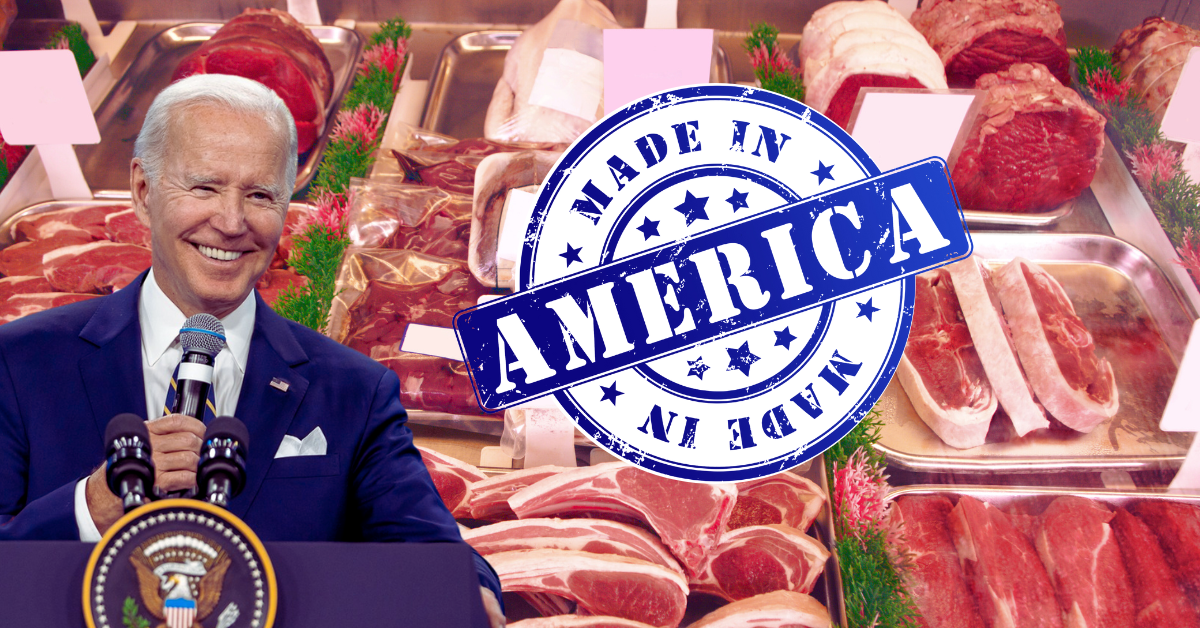
Ex-President Donald Trump’s administration sided with multinational meatpacking companies over local, family-owned farms. But under President Joe Biden’s administration, those federal policies are changing.
MICHIGAN—Farmers know there’s a certain value attached to having a “Product of USA” label clearly affixed to their meat products before they’re placed in the coolers at the grocery store.
A recent federal study concluded that most people take notice of those patriotic labels while they’re shopping for their families. And not only do they seek them out, but they’re often willing to fork over some extra cash for what they perceive to be an authentic, all-American product.
“American consumers are more interested in locally produced, locally processed agricultural products—whether it’s beef, vegetables, chickens, or you name it,” Michigan Farmers Union President Bob Thompson told The ‘Gander. “These labels can make a real difference.”
But until recently, those labels have carried a different meaning than most shoppers expect.
“I wouldn’t go so far as to say that they were lying, but they were certainly misleading the consumer,” Thompson said. “When the consumer looks at packaging in the grocery store and sees that ‘Product of USA’ label on it, they assume that product is from the USA.”
Here’s the deal:
In 2015, federal lawmakers passed a bill that repealed mandatory country-of-origin labeling for muscle cuts and ground versions of beef and pork. As a result, multinational corporations started slapping “Product of USA” labels—which were previously reserved only for American farms—on meat that was imported from other countries and repackaged in the US.
Farmers quickly cried foul, claiming the changes threatened to put American farms and ranches out of business—namely because multinational corporations could afford to sell their products at a much cheaper price, while enjoying the consumer demand of a so-called “American” product.
Under ex-President Donald Trump’s administration, federal regulators repeatedly refused to take action to address those concerns. But last month, under Biden’s administration, the US Department of Agriculture took steps to close the meat labeling loophole once and for all.
What changed?
Under the new federal policy, all meat products (and eggs) sold with the “Product of USA” label must now come from animals born, raised, slaughtered, and processed in the United States.
That’s a sharp change from the old policy, which allowed the label to be used on products from animals that had been imported from a foreign country and then slaughtered in the US, as well as on imported meat that had been repackaged or further processed after it arrived in the US.
And farmers say the change marks a long-sought victory for Michigan’s family-owned farms.
“We believe that this change will be a boon to the smaller producers, in particular, that don’t typically bring cattle in or bring product in from across the borders,” Thompson said. “This will allow them to regain some of that market share that was lost to multinational corporations.”
How did we get here?
Farm Action is a farmer-led group dedicated to fighting corporate monopolies in agriculture and promoting a fair, sustainable, and healthy food system that empowers rural communities.
Co-founders Joe Maxwell and Angel Hoffman said they led the six-year fight for labeling reform—including by teaming up with the American Grassfed Association and petitioning the Trump administration to only allow domestic meat products to bear the “Product of USA” label.
Under Trump, federal regulators denied the group’s petition in 2020. But the group brought their recommendations back to the table when Biden took office in 2021—which ultimately led to a renewed rulemaking process in 2022, culminating with the changes announced last month.
“This is fixing a loophole,” Huffman told The ‘Gander. “There’s still more to be done, but this is huge because it helps stop people from lying. It doesn’t force these producers to tell you where the meat came from—but they can no longer say it came from the US unless it really did.”
What was the problem?
Under the old rules, for instance, a cow could reportedly be raised in Mexico under that country’s regulations for feed and medications, then shipped across the border, and slaughtered that same day to make ground beef and steaks that still qualify as an official “Product of USA.”
Thompson said the misleading labels have been detrimental to smaller, family-owned farms.
“I believe that there have been farmers that have been irreparably harmed,” Thompson said. “The multinational companies can put that product in grocery stores cheaper, typically, and with less quality. I think there certainly have been farmers who haven’t been able to keep up.”
US Agriculture Secretary Tom Vilsack said the new rule will align the labels with consumers’ views—particularly after a federal survey found that nearly two-thirds of shoppers believed “Product of USA” labels meant that most or all meat production steps occurred in the US.
“There’s obviously a disconnect between what the consumers’ understandings and expectations are and what the label currently is,” Vilsack said in an interview with the Associated Press.
‘Good for Our Small Farmers’
Paul Gross, a former Michigan State University Extension educator who now serves on the board of directors for the Michigan Farmers Union, said the federal labeling reforms will help Michigan farmers while giving consumers a clear opportunity to support American farms.
“I think it’s good for our local communities and good for our small farmers, as well as the industry as a whole,” Gross said. “Small farms have to compete with those large-scale operations where those cattle are moved in from all over. It’s hard to be competitive.”
Gross also said the Biden administration’s policies over the last four years have been far “more favorable” to small and mid-sized farms than they were under Trump’s administration.
“I think we’ve got an administration and national legislators that recognize the importance of some of these things, recognize the importance of fair labor, fair policy, and I think we see that,” he said. “I think that’s what really has allowed these reforms to continue to move forward.”
Thomas Gremillion, director of food policy for the Consumer Federation of America, told the Associated Press that the change is a “small but important step” that should have been made long ago. Carrie Balkcom, executive director of the trade group American Grassfed Association, also said the old rule on meat labeling had only served to penalize smaller, domestic producers.
“Consumers deserve the label. Often, it’s the only form of communication between the farmer and the consumer. And it needs to be telling the truth. Consumers deserve that,” Huffman said.
Thompson also gives credit to the Biden administration for addressing farmers’ concerns.
“I think this administration has certainly bent over backwards to try to assist farmers—particularly the smaller, independent family farmers,” Thompson said.
What’s next?
The voluntary labeling rules announced this month still do not mandate country-of-origin labels, which would require companies to disclose where animals supplying beef and pork are born, raised and slaughtered. Those rules were rolled back through federal legislation in 2015.
Huffman and Thompson said they’re now pushing for Congress to pass federal legislation to make the labeling requirements legally mandatory for all meat products sold within the US.
“I think for this particular issue, the current administration that closed the loophole is in the best position to fight to protect that change that they just made,” Huffman told The ‘Gander.
READ MORE: 6 ways Whitmer’s state budget plan invests in rural Michigan
For the latest Michigan news, follow The ‘Gander on Twitter.
Follow Political Correspondent Kyle Kaminski here.
Politics

Trump says he would allow red states to track pregnancies, prosecute abortion ban violators
In an interview published by Time magazine this week, former president Donald Trump detailed his plans for a potential second term and said he would...

Whitmer: Reproductive rights still ‘in jeopardy’ in Michigan
Michigan Gov. Gretchen Whitmer is urging Michiganders to re-elect President Joe Biden in November—or else risk losing access to reproductive...

How to apply for a job in the American Climate Corps
The Biden administration announced its plans to expand its New Deal-style American Climate Corps (ACC) green jobs training program last week. ...
Local News

Detroit date night done right: 12 fresh and exciting ideas
Whether you want to make a good first impression with your latest Bumble match or surprise your spouse with an exciting evening out, Detroit is full...

Black cowboy culture will be on full display at upcoming Flint rodeo
Flint, Michigan, is set to host an exciting and culturally significant event this June: the Midwest Invitational Rodeo. This eagerly anticipated...






